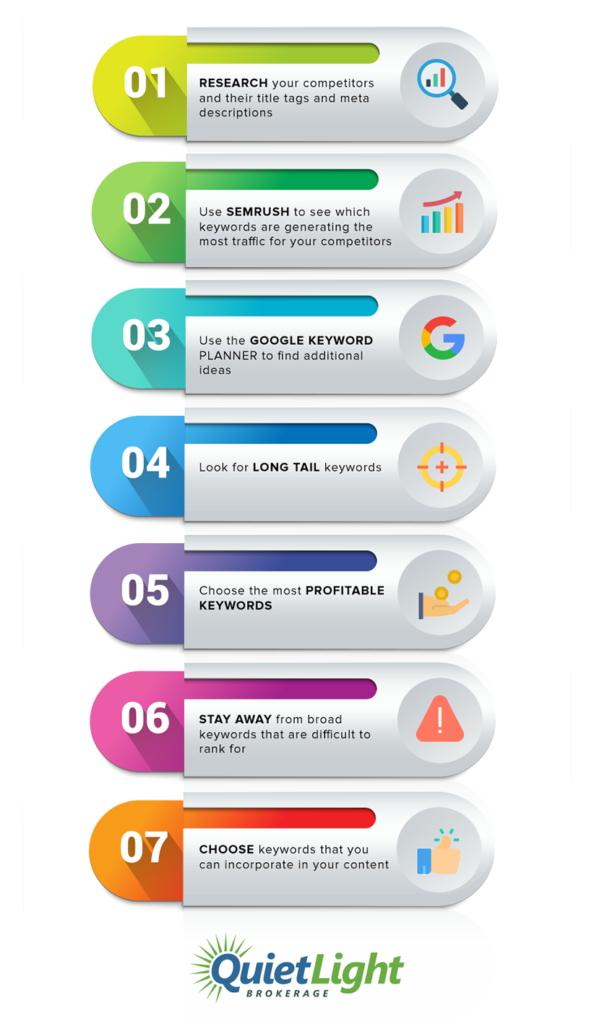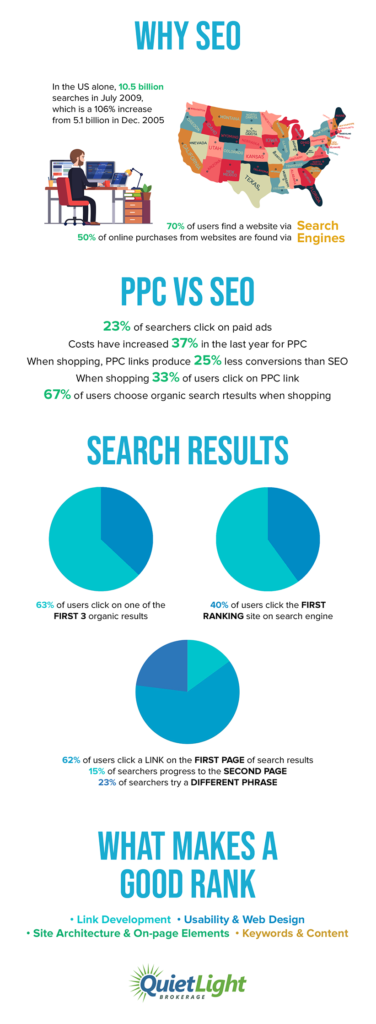Topics:
Never Miss a Beat - Get Updates Direct to Your Inbox
FILTER:


SEO Strategy: 4 Ways to Punch Above Your Weight & Take Down Goliath
By Quiet Light
Search engine optimization: everybody claims to know what it is and how to ace it, and yet, true SEO pros are hard to come by. Search engines are changing, and that means website owners have to keep up with the times. But how do you get away from sissy slaps to heavy-hitting SEO that actually wins the match? Jeff Coyle, Co-founder of MarketMuse, shares a refreshing approach to SEO that should alarm (and inspire) every website owner. Get 3 quick wins for your website, learn how to gauge SEO success, and make 4 long-term fixes to punch above your weight for SEO.
IN THIS POST
And In This Corner—Jeff Coyle!
A Stiff Right Hook to Traditional SEO Attitudes
Need a Quick Knockout? 3 Quick SEO Wins for Newly Acquired Sites
How to Gauge SEO Success
4 Better SEO Moves To Punch Above Your Weight
Go One More Round
The classic underdog, Rocky Balboa, took on boxing giant Apollo Creed with a ton of grit, heart, and muscle. Even though Rocky was the underdog, he came out swinging to take down a giant.
For most website owners and entrepreneurs, it feels like they’re underdogs fighting against heavy-hitting giants in the world of SEO. No matter how hard you train or how many SEO tools you buy, those other guys keep knocking you out the moment you enter the ring.
The crappy truth is that everyone thinks they’re a contender, but few websites come out of the ring a champ. What’s going on?
Well, for starters, your gloves are on the wrong way. Entrepreneurs understand just enough SEO to get themselves in trouble. You probably know a little bit about keyword optimization and search volume, but that’s it. A little bit of knowledge will get you into the ring, but that doesn’t mean you’ve got the chops to emerge victorious.


Forget everything you’ve ever learned about SEO because 90% of it is garbage. If you want to punch above your weight, it’s time to act like a champ, champ. Absorb the punches as they come and go 15 rounds with even the most intimidating SEO opponents with the right strategy.
Co-founder and Chief Product Officer of MarketMuse, Jeff Coyle, shares his blunt (and contrarian) steps to actual SEO success. Get quick knockouts for your website, gauge SEO success, and do 4 smart SEO moves to go from underdog to winner.
And In This Corner—Jeff Coyle!
Jeff Coyle remembers the early days of search engine optimization. He got his start over 20 years ago, optimizing B2B tech sites for leads. After tinkering on a handful of sites for a number of years, Jeff generated 15 million (yes, million) leads.
B2B websites need a little extra help. Since B2B customers have more decisionmakers and red tape, it can take ages to bring someone through your buying cycle. You’ll be old and gray by the time the ink dries on the contract. So yeah, B2B websites have to take a different approach to SEO than B2C companies.


In Jeff’s opinion, the best way to drive this engagement is both simple and complex: content driven by SEO. “I’m focused on driving engaged users through content strategy,” he says. But Google University has churned out many low-quality SEO hobbyists. Jeff not only wanted to help B2B brands master their SEO, but also address stupid and disturbing trends in SEO that bring everyone down.
Jeff founded MarketMuse with the hopes of helping brands:
- Assess their own authority
- Know their strengths
- Find their gaps
If you’ve ever wondered, “Is this blog getting me business, or is it going to float away into the void?”, Jeff’s SEO approach can give you an answer. But first, for the love of all that’s good, stop focusing so damn much on keywords.


Listen to the Source of this Post:
This blog post is based on a podcast episode that we recently recorded. Listen to the full episode here:A Stiff Right Hook To Traditional SEO Attitudes
If you think, “Oh gee, SEO? That’s just stuffing keywords into a blog, right?”, you’re going to get smacked in the face by the competition. This is like showing up to a boxing match with your mom’s oven mitts—it’s misinformed, short-sighted, and will only bring you pain.
“Keywords aren’t the whole picture of how you should write your content,” Jeff says. Now, that doesn’t mean you can throw keywords out completely. Low competition, high volume keywords are still special little unicorns that can boost traffic if you know how to use them.
But to base your entire content and SEO strategy on keywords alone is like Apollo Creed saying, “You ain’t nothin’ but a bum!” to Rocky in the ring. Don’t discount other approaches just because you think keywords are the greatest thing since Muhammad Ali. “Don’t base thousands of dollars spent on content strategy chasing keywords,” Jeff says.


Why Keywords Put You On The Ropes
A new keyword strategy won’t fix your content or SEO problems. Sure, keywords are okay for information retrieval, but they aren’t an SEO strategy. After all, boxers don’t just focus on their arms when they fight. Fancy footwork and psychological tricks make the fighter, not just the power of his punches.
A heavy focus on keywords and search traffic will make you discount diamonds in the rough. You’ll never find your Rocky because you aren’t even looking. You’re blind to ideas beyond what your SEO tool spits out, and that’s a dangerous position to be in.
So let’s get over the idea that keywords = SEO.


Now that we’ve cleared that up, what are you supposed to do instead? Jeff says the new frontier for SEO is something that content marketers have been harping about for years: content strategy. What he means is that the topics you write about actually have more weight than the keywords that people cling to so dogmatically. “What should you write next? That’s what’s going to have the biggest impact on your business,” Jeff says.
Actually, you should let your competitors continue to focus so much on keywords. That gives you the opportunity to sneak up behind them, catch them off guard, and climb up through the SERPs. When you commit to publishing the right content topics, you get more value and opportunity from your website.
Need A Quick Knockout? 3 Quick SEO Wins For Newly Acquired Sites
At first blush, “SEO” and “quick wins” don’t sound compatible. After all, like training a prized fighter, SEO takes months of careful preparation before you see big results. Fortunately, Jeff says you can get 3 quick wins for any website, whether you’ve recently acquired a web property or just want to jazz up your current online presence.


1. Check Your Exit Rates
Your goal here is to find low-hanging fruit. Aim for the easiest, weakest parts of your site and concentrate your quick fixes there.
The best place to find quick wins is your exit rate. “Look at your worst exit rates,” Jeff says. Every page on your site has an exit rate, and that tells you what percentage of users left your site after looking at that page. This is different than your bounce rate; exit rate is the ratio of where users leave after checking out several pages on your site.
Peek at your analytics to find the worst offenders. Where are people dropping off the most? Make a list of your top 5-10 worst pages. Upon review, you might find something obviously wrong, like a 404 error or a weird design glitch. If that’s the case, stitch it up and get back in the ring, boss!
2. Find Intent Mismatches
But if you don’t find any obvious issues with the page, you might have a problem with intent, which is trickier to fix. Figure out what’s taking people to the page where they’re exiting. What keywords are they searching for? What page were they on before they exited the current page?


If users click on the page expecting to learn about “boxing gloves” and the content is about “knitting gloves,” they’re going to leave. Work backward to figure out what in the world users expect from the page. If you aren’t delivering what they want, no wonder they’re leaving! Fix that ASAP to satisfy user intent so they’ll stick around longer on your website, telling Google that your content is the bomb-diggity.
3. Boost A Page Of Interest
You can get a quick SEO win when you boost a page that’s already performing well. I guarantee you’ve got a page like this already and you don’t realize it.
Dive into your Google Analytics and find pages with high traffic, good conversions, or whatever KPI that matters most to you. “Look at your existing power pages to see where you’re already getting value,” Jeff says. What is this page ranking for? Why are people reading it? What’s different about this page?


See if you can increase this page’s value. Add new sections talking about related topics, step by step how-tos, media, and any other content improvements that would entice users to spend more time on your site. By pumping more juice into your heavy-hitting pages, you can get more wins without the agony of training.
How To Gauge SEO Success
Phew! Feel warmed up yet? Well, put up your dukes, because we’re just getting started, champ. But before we get into the nitty-gritty of your SEO overhaul, you have to measure your success. You can’t get better if you don’t know your numbers. That’s why boxers keep track of their rounds, knockouts, weight, and other stats to become better fighters.
Traditionally, website owners have looked at their existing and historical SEO rankings to evaluate a website. That’s … okay, but it’s not telling you the whole story. The numbers alone won’t mean anything to you. They aren’t accounting for your business goals, customer engagement, inventory, or anything else. If you divorce these concepts from SEO, you’ll never measure the true ROI of your SEO efforts. “So many people talk about ROI, but they can’t explain how they calculate it,” Jeff says.


You’ve got to know your stats, champ. Jeff recommends this three-step process to gauge the success of your SEO.
1. Choose Heavy-Hitting KPIs
We’ve got to look at our stats. “You’ve got to start with key performance indicators,” Jeff says. Remember, any fighter worth his salt is looking at his stats. As an SEO-minded entrepreneur, you’ve got to do the same.
What KPIs matter most to you? It’s going to be different for every site. For example, an eCommerce site is going to care more about average order size than, say, page views. Be sure you’re looking at KPIs that actually deliver value; they’re called key performance indicators, after all.
Now that you know what to measure, see how your content stacks up. What do your current and historical conversion rates look like? Do they suck? Are they hitting better than you imagined? Either way, make note of your past performance.
But don’t stop there. It’s not enough to say, “Hm, well, I guess we did okay for the past 12 months. Nothing to do here.” There’s always something you can do to improve your SEO. Take this time to set an aspirational KPI: this is your stretch goal for SEO performance. Make this even more badass by squishing that aspirational KPI inside a SMART goal. This way, you can see where you are today, where you want to be, and identify steps to fill that gap.


2. Audit Your Content
You can’t move forward until you know where you are. “I want to see where I’ve written great content,” Jeff says. Do an audit of all of your website content. Yes, all of it. Every landing page and blog is up for grabs here. The purpose of the audit is to assess the real SEO value of your site. Whip out those snazzy Google Sheets to track your progress and start your training regimen for the big fight.
During this audit, look at:
- Content that performs well
- Successful topics
- How much content you’ve written about each topic
- The levels of engagement (ie. comments or shares) on each piece
- Where your traffic comes from. Get granular and look at specific attribution channels (so instead of “social media,” use “Facebook Ads”).


3. Slice And Dice Your Site
But wait, there’s more! Don’t just look over your content in a humdrum, military-like fashion. “Think critically about your content inventory,” Jeff says. Put your site into sections by performance. Jeff likes to call this the “slice and dice:” figuring out which clusters of content on your site get more attention than others.
Segment your site into clusters based on performance. This is how search engines are looking at your site, anyway. Segment the high-performers from the rest of the pack to do a more thorough analysis of your badass content. Make note of your winning content so you can get more mileage out of it during your SEO overhaul. “Winning” depends on your KPIs, of course. Slice and dice in a few ways to get a better view of your site. Do this by site sections (blogs versus product pages), by author, by date, or any other differentiator.


The slice and dice method will help you bob and weave beyond the competition. By looking at your site through the lens of content clusters instead of plain Jane metrics, like traffic, you start to think on a high-level that helps you identify your more successful content.
4 Better SEO Moves To Punch Above Your Weight
You’ve ditched the keyword-first attitude, found 3 quick wins, and set up a system to gauge success. Now you’re ready for the final match: an SEO overhaul. Jeff recommends these 4 steps to get your website in fighting shape.
1. Bring Your Winners Back To The Ring
Everybody goes nuts for Rocky, but you’re a little cuckoo to put a rookie in the ring against a champ. You’re fighting against other Apollos—now isn’t the time to break out an underdog unless you’re really, really desperate. The best way to overhaul your SEO is to start where you already have wins.


It’s kind of a “chicken or the egg” scenario, but that’s how SEO works: you need to start where you have existing power to get more power. When you start where you’ve already got momentum, it’s easier to get the ball rolling.
What can you write about and expect it to be successful?
Remember that site audit you did? Whip out your heavy-hitting content right now. Use these heavy-hitters as a platform to boost your other content. You can do this in 3 ways:
- Create topic clusters: What topics do your badass content pieces cover? Create topic clusters around those topics to boost your thought leadership. For example, if you got a lot of traction writing about boxing gloves, try writing about other gear, like footwear or trunks.
- Write support pieces: Once you have these content clusters, write support pieces that complement your content all-stars. Search engines will take note of how your content relates to each other in a topical way, giving you more opportunities to hit the ring.
- Interlink your content: But don’t forget to link your support pieces to your winning content. That’s the best way to spread the SEO love throughout your site. Not only will this keep human users on your site longer, but it will also boost SEO.


Whatever you do, don’t let your superhero pieces lie dormant. “There are so many things you can do to repurpose. When you get a winner, use the winner,” Jeff says. Use the hell out of them and connect them to the new content you’re writing.
2. Measure Your Efficiency Rate
Okay, so you’ve got rookie content and you’re desperately training it to take on an SEO behemoth. You need to measure how effective you are at training this rookie content to see how your efforts move the needle for SEO.
Jeff recommends doing this with something called your “efficiency rate.” Let’s say you’re writing or updating 100 existing articles. That’s no small feat. But you knuckle down and do the work. Once everything is updated, you need to see what results you got from all of your hard work.
Remember your KPIs? Measure each piece of content against your baseline KPI goals. Which pages were a knockout? Which ones fell flat? Your success-to-failure ratio will be your efficiency rate. So if you update 100 articles and 10 reached your KPIs, you have a 10% efficiency rate.


But you don’t want a 10% efficiency rate because that sucks. Jeff’s seen 1% efficiency rates, which are a horrible waste of team and a sign something’s amiss with your SEO efforts. “It scares the crap out of me when I update 100 articles and see a 2% efficiency rate,” he says.
You should shoot for a 40% efficiency rate on average. By measuring your efficiency rate, you’ll see how effective your SEO improvements actually are. It feels like a punch to the jaw when your SEO isn’t working, but the measuring is half the battle.
3. Find Your Gaps
“If you can find gaps in their game, you can punch above your weight,” Jeff says. SEO and boxing are equal parts art and science. If you want to take down an SEO champ, don’t challenge him in a place where you know he’s going to knock you out cold. Instead, look for his gaps: does he fail to block effectively, or have subpar footwork?
When you identify your SEO competitors’ gaps, you can swoop in and win the fight, even if you don’t have good equipment or a beefy physique. SEO is about being smarter, not stronger, than your competition.


Jeff says strategy wins the round every time. If your SEO hasn’t worked up to this point, dunk some cold water on yourself, bud. Isn’t the definition of “insanity” doing the same thing over and over and expecting different results? That goes for SEO. Don’t fight a champ with one arm tied behind your back. Get real about what you do well and focus your efforts there.
Jeff says you can overhaul your SEO to punch above your weight class with 3 types of analysis:
- Competitive analysis: Who’s churning out badass content in your niche? Who’s puny and unimpressive? Whether they’re weak or strong, they’re still your competition. Note the difference between the power players and the strugglers. What do the strong websites have that you should incorporate? What should you avoid?


- Semantic analysis: Peek at your own superhero content. What words are related to the topics that perform well for you? Focus on these auxiliary topics to get traction. (We’ll dive deeper on this in just a sec)
- Overall gap analysis: Look at your aspirational KPIs. Where are you right now? What metrics do you need to hit to get to your aspirational KPIs? For example, if you’re ranking #10 for a certain term and you want to rank #1, you’ve got to move up 9 ranks to get there. But instead of focusing on that huge gap, look at smaller gaps. Where are you ranking at #2 or #3? Optimize there first, and then use the added SEO juice to overcome your larger gaps.
SEO is about knowing what you don’t know. That’s why tools are really important. They get you out of your head and help you find these gaps more quickly. It comes down to whatever you’re comfortable with, but a few good options include:
- SEMRush
- ScreamingFrog
- Advanced Web Ranking
- MarketMuse (just sayin’)


If that sounds like too much, you can also try partnering with an SEO or content strategist to get you off on the right foot. An outside perspective can always help you hit harder, faster.
4. Choose Bold Topics
Semantically-related concepts are so important to SEO. They’re what the whole “keyword craze” has been trying to nail down: that ideas are linked to each other. Search engines are just now ramping up their algorithms to connect topics and ideas for SEO in lieu of keyword density.
Now is the time to be fearless. Don’t swipe your competitors’ content calendar to write carbon-copy blogs. Originality is key if you want to sidestep an SEO Goliath. You’re probably not going to outrank Amazon for the keyword “Amazon,” so look elsewhere for content ideas.


Look at your previously successful content. Brainstorm a list of semantically-related concepts around that idea. The idea is to expand your “idea inventory” around that piece. For example, if you run an eCommerce site and had a successful blog about shipping, you could also write about:
- Eco-friendly shipping options
- How to save money on shipping
- Repurposing shipping boxes
These ideas are more likely to have success because they’re niche and specific. Because fewer sites are talking about these ideas, you have a better chance of boosting SEO. As you write more about niche topics and build your rank, you stand a better chance of ranking for the more competitive, general terms over time.
Don’t be afraid to cover topics that no one else is covering. That’s part of filling the gap in the world of SEO. It’s also the best way to boost your authority and uncover more SEO wins.


Go One More Round
It’s hard to go from rookie to champ in the technical world of SEO. But when you ditch outdated SEO practices, like obsessing over keywords, you can finally punch above your weight. Get quick wins by checking out your exit rates, fixing intent mismatches, and boosting your superhero content. Gauge success by setting clear KPIs, auditing your content, and segmenting your site by performance.
Once that’s done, it’s time to bring your winning content back into the ring, measuring your efficiency rate, locating your gaps, and getting fearless with our content topics. Whatever you do, start now. Pick an idea you like, get a few wins under your belt, and prove your strategy is viable. If it doesn’t work out, get back up the next day and try something new.
The beauty of SEO is that it’s an ongoing process. You fight every day to become the best. That might mean you won’t win today, but you just might score a championship belt tomorrow. As our pal Rocky once said, “It’s not about how hard you hit. It’s about how hard you can get hit and keep moving forward.” That’s how winning happens, champ. Are you ready to put up your dukes and return to the ring?





